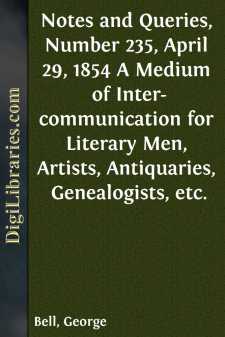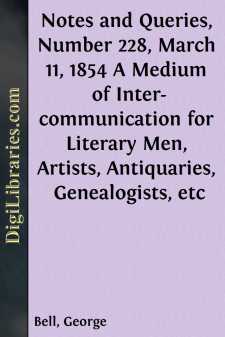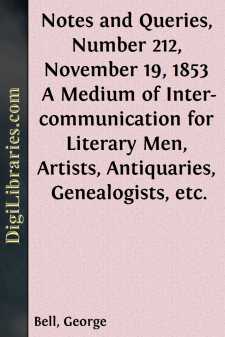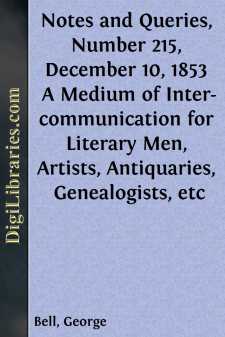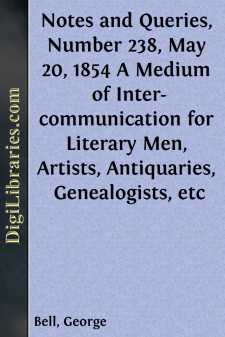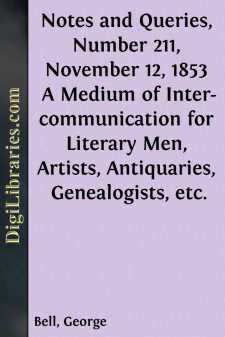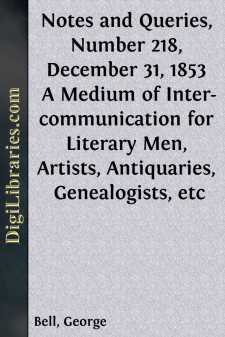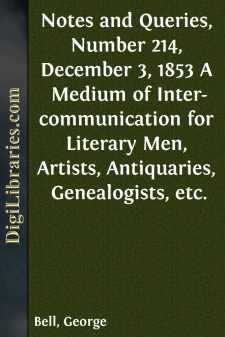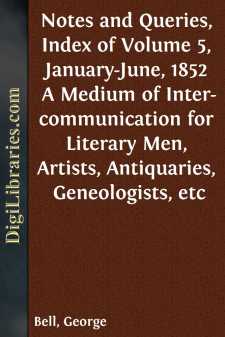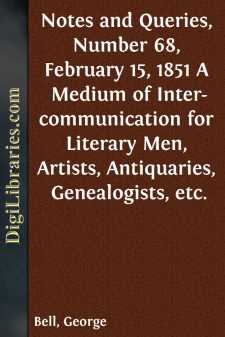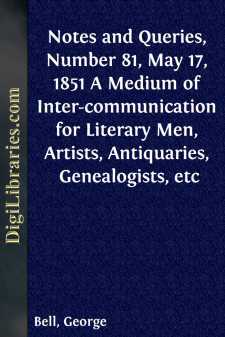Categories
- Antiques & Collectibles 13
- Architecture 36
- Art 48
- Bibles 22
- Biography & Autobiography 813
- Body, Mind & Spirit 142
- Business & Economics 28
- Children's Books 17
- Children's Fiction 14
- Computers 4
- Cooking 94
- Crafts & Hobbies 4
- Drama 346
- Education 46
- Family & Relationships 57
- Fiction 11829
- Games 19
- Gardening 17
- Health & Fitness 34
- History 1377
- House & Home 1
- Humor 147
- Juvenile Fiction 1873
- Juvenile Nonfiction 202
- Language Arts & Disciplines 88
- Law 16
- Literary Collections 686
- Literary Criticism 179
- Mathematics 13
- Medical 41
- Music 40
- Nature 179
- Non-Classifiable 1768
- Performing Arts 7
- Periodicals 1453
- Philosophy 64
- Photography 2
- Poetry 896
- Political Science 203
- Psychology 42
- Reference 154
- Religion 513
- Science 126
- Self-Help 84
- Social Science 81
- Sports & Recreation 34
- Study Aids 3
- Technology & Engineering 59
- Transportation 23
- Travel 463
- True Crime 29
Notes and Queries, Number 235, April 29, 1854 A Medium of Inter-communication for Literary Men, Artists, Antiquaries, Genealogists, etc.
by: George Bell
Description:
Excerpt
CURIOUS OLD PAMPHLET.
Grubbing among old pamphlets, the following has turned up:
"A Fragment of an Essay towards the most ancient Histories of the Old and New Worlds, connected. Intended to be carried on in four Parts or Æras. That is, from the Creation of all Things to the Time of the Deluge: thence to the Birth of Abraham: from that Period to the Descent of Jacob and his Family into Egypt: and, lastly, to the Time of the Birth of Moses. Attempted to be executed in Blank Verse, 8vo. pp. 59. Printed in the year 1765."
This Miltonic rhapsody supposes Adam, when verging on his nine hundreth year, to have assembled his descendants to a kind of jubilee, when sacrifices, and other antediluvian solemnities, being observed, "Seth, the pious son of his comfort, gravely arose, and, after due obedience to the first of men, humbly beseeched the favour to have their memories refreshed by a short history of the marvellous things in the beginning." Then Adam thus:—Hereupon the anonymous author puts into the mouth of the great progenitor of the human race a history of the Creation, in blank verse, in accordance with the Mosaic and orthodox account. Concluding his revelations without reference to the Fall, Seth would interrogate their aged sire upon what followed thence, when Adam excuses himself from the painful recital by predicting the special advent in after times of a mind equal to that task:
"But of this Fall, this heart-felt, deep-felt lapse,
This Paradise thus lost, no mortal man
Shall sing which lives on earth.
Far distant hence
In farther distant times, fair Liberty
Shall reign, queen of the Seas, and lady of
The Isles; nay, sovereign of the world's repose.
And Peace!
In her a mighty genius shall
Arise, of high ethereal mould, great in
Renown, sublime, superior far to praise
Of sublunary man—or Fame herself.
Though blind to all things here on earth below,
The heav'ns of heav'ns themselves shall he explore,
And soar on high with strong, with outstretched wings!
There sing of marvels not to be conceived,
Express'd, or thought by any but himself!"
This curious production is avowedly from the other side of the Tweed, and I would ask if its paternity is known to any of your antiquarian correspondents there or here.
The Fragment is preceded by a very remarkable Preface, containing "some reasons why this little piece has thus been thrown off in such a loose and disorderly manner;" among which figure the desire "to disperse a parcel of them gratis,—because they are, perhaps, worth nothing; that nobody may pay for his folly but himself; that, if his Fragment is damned, which it probably may be, he will thenceforth drop any farther correspondence with Adam, Noah, Abraham, &c.; and, lastly, that he may be benefited by the criticisms upon its faults and failings, while he himself lurks cunningly behind the curtain. But if, after all," says the facetious author, "this little northern urchin shall chance to spring forward under the influence of a more southern and warmer sun, the author will then endeavour to bring his goods to market as plump, fresh, and fair as the soil will admit."
I presume, however, the public did not call for any of the farther instalments promised in the title....


